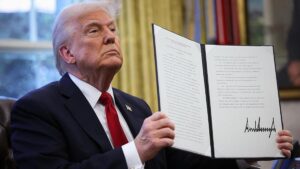U.S. Secretary of State Antony Blinken marked the first anniversary of the signing of the Abraham Accords on Friday with a half-hour video call where no one mentioned Donald Trump or Benjamin Netanyahu, the prime minister who pushed the deals through.
The event was attended by representatives of the member states: Foreign Minister Yair Lapid, his Moroccan counterpart Nasser Bourita, the United Arab Emirates’ diplomatic adviser to the foreign minister, Anwar Gargash, and Bahrain’s ambassador to the United States, Abdulla Al-Khalifa.
The event was not attended by Sudan, which also signed an agreement with Israel.
Blinken said the Biden administration, Israel and other countries in the region “will continue to build on the successful efforts of the previous administration to keep normalizing marching forward.” The United States will “help foster Israel’s growing ties” with the current signatories to the accords as well as new ones, he added.
Lapid agreed that “the Abraham Accords club is open for new members” and that the signatories hope other countries will join “this new era of cooperation and friendship.”
The signing of the Abraham Accords on the White House Lawn, one year ago. Andrea Hanks
COVID-19 has shown that “there is no such thing as local problems or challenges – all challenges are global,” he said, adding that as the world addressed COVID-19, it must also address other issues including the economy, while “creating a new discourse in the region.”
Blinken said Bahrain and Israel were “the first countries to mutually recognize one another’s digital COVID-19 vaccine passports,” exempting visitors from quarantine and encouraging travel. Despite COVID, “more than 130,000 Israelis visited the United Arab Emirates just in the first four and a half months after the accords were signed,” he added.
U.S. marks Abraham Accords one-year anniversary in online event
A year after their signing, here’s how the Abraham Accords changed the Middle East
Israel, Arab states celebrate Abraham Accords anniversary at Kushner’s party
Lapid said he would soon visit Bahrain, the first time an Israeli minister has visited the country. Blinken mentioned that an Israeli Embassy recently opened in Abu Dhabi, UAE, and that Bahrain’s first ambassador to Israel presented his credentials this week.
The Palestinian issue was also discussed; Lapid called on the various countries to help Israel promote his “economy for security” plan to rebuild Gaza. All the speakers said Israel must now seek an agreement with the Palestinian Authority as well.
“Relaunching the peace process is fundamental. Morocco believes that there is no other alternative to a two-state solution,” said Bourita, the Moroccan foreign minister, adding that Israel must preserve Jerusalem as “a common heritage of humanity, as a symbol of peaceful coexistence of the followers of the three monotheistic religions.”
Gargash of the UAE said “we feel that the Abraham Accords will allow us to help and assist further in the peace process, leading to what we all see as the ultimate goal of a two-state solution. This, of course, will be up to the Palestinians and Israelis to agree. But I think we can all be more constructive as we build a network of trust.”
Israel signed a normalization agreement with the UAE and Bahrain at the White House on September 15, 2020. Morocco and Sudan later signed the accords, mediated by the Trump administration. The agreements include cooperation in a variety of civilian areas as well as the opening of diplomatic missions in the various states.





